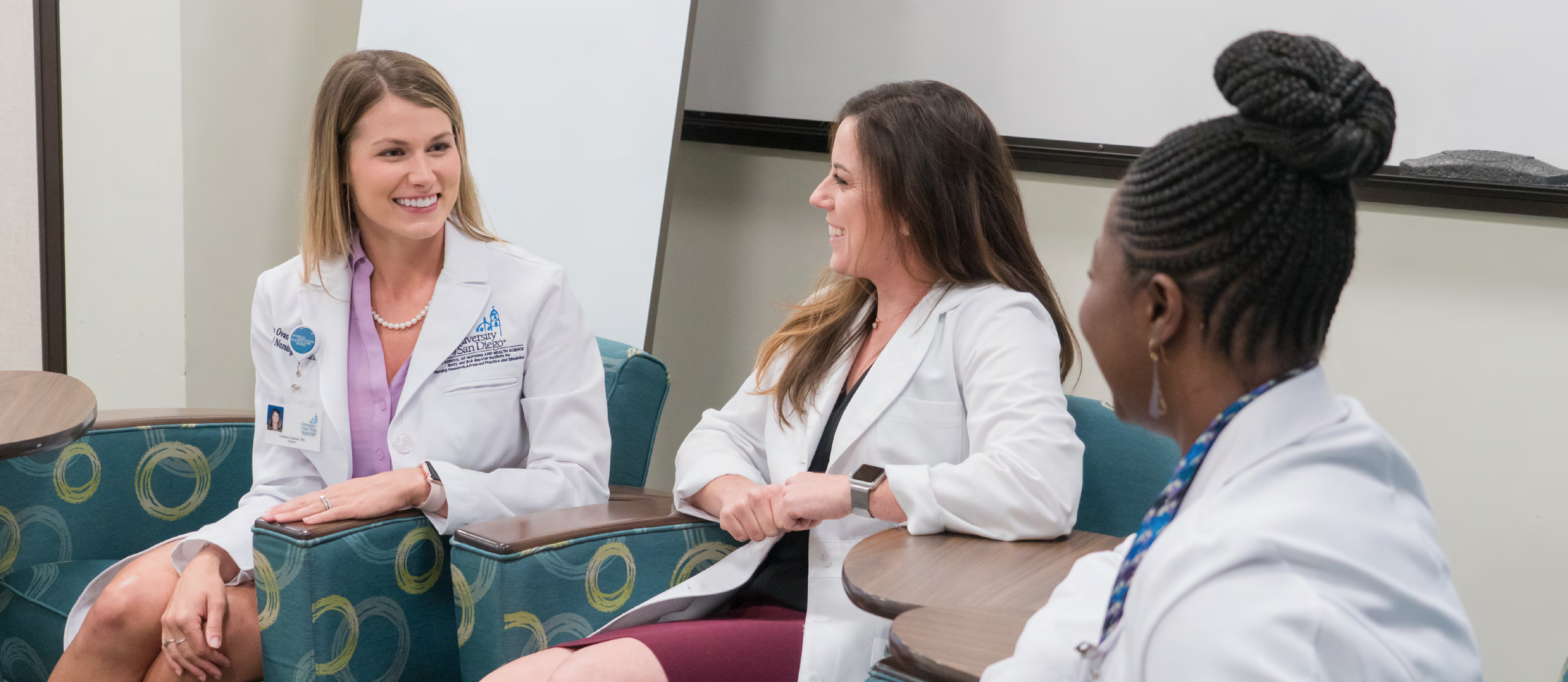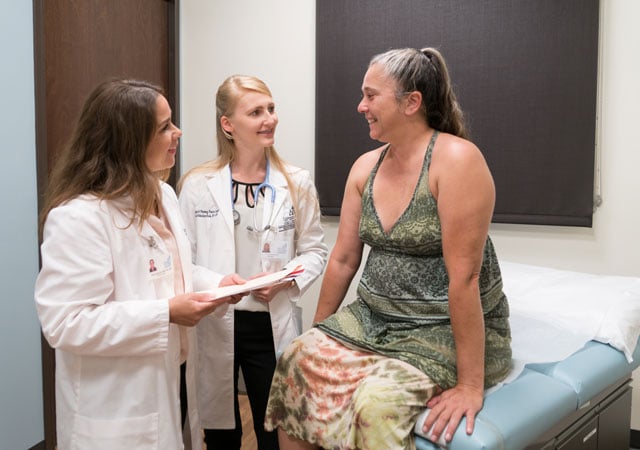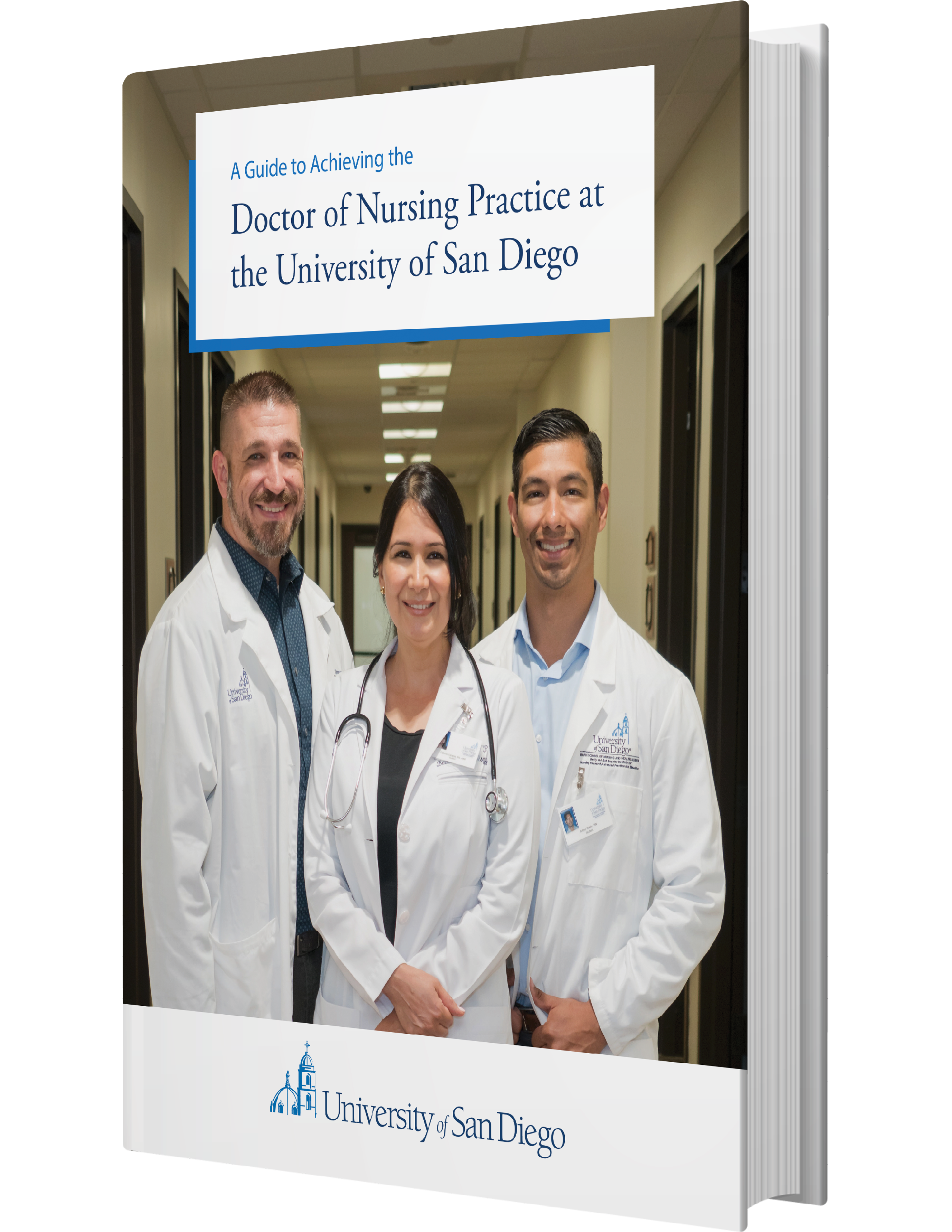A Guide to the MSN to DNP at USD
Why Get a Doctor of Nursing Practice?
If you aspire to become a change-maker in nursing, well-prepared to lead the charge of improving health care in our country, our Doctor of Nursing Practice (DNP) Program may be the right choice for you. Although we offer several paths of study in pursuit of this terminal degree, some elements remain consistent: a mastery of clinical practice, a drive to lead and a commitment to human connection.
Our DNP program prepares nurses at the highest level of proficiency as they learn to translate science into clinical practice. Students develop the skills to lead collaboratively, integrate research into care, and design better health care delivery systems. Some of our DNP students focus their studies on delivering complex care over the lifespan of one population. Others scale up their impact to shape entire systems, organizations, and policies through executive or administrative roles.
Whatever your intended focus, you will earn your DNP in a unique environment that blends academic strength with nurturing support. Here, what truly fosters our students’ success is their personal connection to our expert nurse faculty, as together, we push science into practice.
A Guide to Achieving the
Doctor of Nursing Practice at USD
Download USD’s Doctor of Nursing Practice guide for an in-depth look at the program and how our rich heritage of excellence in nursing education can help you achieve your academic and professional goals.

About the Program
The MSN to DNP program is a hybrid program designed to prepare clinical leaders for the profession who have expertise in advanced nursing practice specialties with an individual or aggregate focus. This program is offered for master’s prepared nurses. We combine the benefits of face-to-face learning with the flexibility of distance education. Students attend on-site intensives at our peaceful campus two weekends each semester, while completing the remaining coursework online. In every interaction, whether on-the-ground or online, our faculty of internationally recognized scholars and clinicians are devoted to each student’s success.
MSN to DNP
Program Outcomes
MSN to DNP
Frequently Asked Questions (FAQs)
When is the application deadline? How often are students admitted?
The priority application deadline for the MSN to DNP program is March 1 and the final deadline is July 1.
Is a master's degree in nursing required for admission to the Post-MSN DNP program?
The MSN-DNP, or Post-MSN program is offered for master’s prepared nurses. There are four pathways for the MSN to DNP program: DNP Advance Practice track; DNP Nursing Informatics and Data Science track; DNP in Health Systems Leadership track; and DNP in Emergency Care track for those who are currently FNPs.
How many units is the program?
The program ranges from 34 to 55 units in length depending upon the track selected.
Can I attend the program on a part-time basis?
Full-time or part-time enrollment is available. Students who attend full-time complete the degree in two years. Students who attend part-time usually complete the degree in three years.
When are classes offered?
The MSN to DNP program is a hybrid program. The program offers the flexibility of distance education coupled with the benefits of face-to-face learning. Students attend on-campus intensives two weekends each semester while completing course work through distance learning.
USD is only accepting applications from California residents for two tracks: the Advanced Practice track and the Emergency Care for Family Nurse Practitioners track. Students in the DNP in Emergency Care for Family Nurse Practitioners complete DNPC 610 on campus during the summer session.
What is the scholarly practice requirement?
The DNP scholarly practice requires clinical hours in your specialty and a DNP translational science project. For the project, students will identify a clinical problem or professional practice issue identified from careful analysis of a practice population and/or system; develop and implement an innovative, culturally competent, sustainable, evidence-based solution using principles of translational science; and implement and evaluate the outcome(s). Foundational coursework in the DNP program will prepare students to successfully complete the translational science project.
Can international students join this program?
Due to the significant online portion of this program, USD is unable to sponsor student visas for this program. However, if you have a legal status that allows you to study in the US then you are welcome to join the program. One example of an eligible legal status would be US permanent resident status.

The Dickinson Nursing Simulation Center
Realistic scenarios play out in the Dickinson Family Foundation’s Lizbeth Dickinson Smoyer Nursing Simulation Center (DNSC). The DNSC is the keystone of the school’s clinical teaching facilities and a national model for nursing education. Located on the first floor of the Beyster Institute for Nursing Research, the DNSC houses an eight-bed clinical skills classroom equipped with highfidelity human patient simulators, six primary care exam rooms, three acute care hospital rooms with observation rooms, a medication station, three debriefing rooms, a green room for patient-actors, control rooms, equipment and store rooms, along with a faculty/staff office suite.
Learn more about the DNSC.About the Hahn School of Nursing and Health Science
The Hahn School of Nursing and Health Science was founded more than 40 years ago on the beautiful campus of the University of San Diego. Our school consistently ranks among the best graduate nursing schools locally and nationally, but that’s not the only reason future students walk through our doors to pursue one of our graduate degrees.
The personal connections between faculty and students fuel our collective success and impact. Compassion isn’t just woven into our coursework — it’s embodied in our commitment to you. As scholars and clinicians, we value your talents and experiences. We’re here to mentor, nurture, and uplift you as you become all you’re meant to be.
Explore Our Programs
Learn about your program of interest by visiting the programs page on our website. Review information on admissions, financial aid, and much more.



